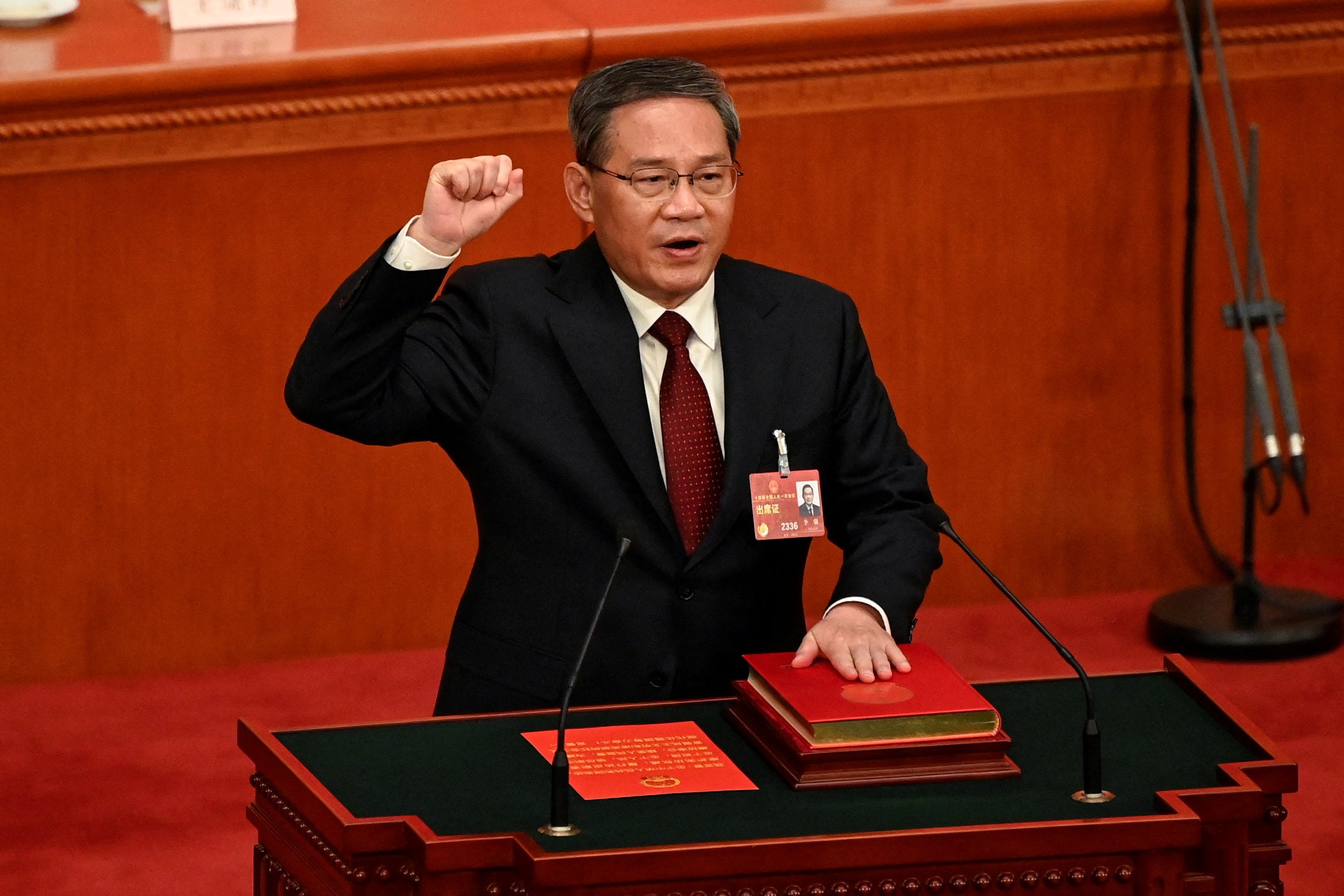Li Qiang: Xi Jinping’s right-hand man behind sweeping Covid lockdown elected China’s new premier
Xi loyalist is now China’s second most powerful man


Li Qiang has formally become China’s next premier in a role that has traditionally entailed wielding broad authority over economic policy for the world’s second-largest economy.
Mr Li was formally elected on Saturday as the second most powerful man in China, after president Xi Jinping had earlier nominated the 63-year-old for the role.
The National People’s Congress had 2,936 votes in favour of Mr Li, and three against him. There were eight abstentions.
The new premier previously served as Shanghai’s Communist Party chief, and recently gained notoriety for implementing last year’s bruising two-month Covid lockdown in Shanghai. Mr Li also pushed for the sudden and chaotic end to the country’s zero-Covid policy after unprecedented protests.
His appointment comes during an annual political event in which Mr Xi secured an unprecedented third term as president on Friday, solidifying his unchallenged grip on power and opening up the possibility that he could remain in power for life.
Mr Li replaces Li Keqiang, who served as China’s premier for 10 years. Li Keqiang, a former Communist Party official, made what appeared to be a veiled attack on Mr Xi in a farewell message to his staff: “While people work, heaven watches. Heaven has eyes.”
Li Qiang is tasked with reviving the world’s second-largest economy, which is yet to emerge from the effects of three years of sweeping Covid restrictions.

Traditionally, the premiership conveys significant influence over economic policy. The power of the role, however, has been eroded under Mr Xi’s leadership during the past decade, as the president has primarily consolidated control in his own hands.
Some analysts believe Mr Li could play a larger – if not more influential – role than his predecessor. But this will be no easy task, as he is expected to tackle an economic downturn as the government expects to expand the economy by “around 5 per cent” this year – the lowest target in more than three decades.
China is facing a historic decline in its key housing market, consumer spending is languishing, and unemployment remains high among its youth amid the waning trust of investors.
After studying agricultural mechanisation at a college in the city of Ningbo, Mr Li began his career as a worker at an irrigation pumping station. He rose to power in the Chinese government after working his way up through provincial bureaucracy.
The new premier served Mr Xi as his chief of staff between 2004 and 2007, when the Chinese leader was the provincial party secretary of eastern China’s Zhejiang province. After Mr Xi became president in 2013, Mr Li became the governor of his native Zhejiang in 2012, then the Communist Party chief of Jiangsu province, before becoming Shanghai party secretary in 2017.
His pro-business credentials include pursuing Tesla founder Elon Musk to build its first factory outside the US in Shanghai. The two signed a deal in 2018, and Tesla broke ground half a year later as the first wholly foreign-owned carmaker in China. He is also credited with creating a Nasdaq-style stock market in Shanghai.
His appointment is seen as an important development by leadership observers, as Mr Xi is installing a slate of loyalists in top jobs amid the biggest government reshuffle in decades, which is expected to further consolidate his power.
On Saturday, the election process, wherein ballots were cast during a meeting of the rubber-stamp parliament, was entirely shrouded in secrecy, with no reporters allowed in the room.
Lawmakers rose to applaud as Mr Xi cast his vote. Following the voting, Mr Li took an oath, swearing to abide by China’s constitution and to “work hard to build a prosperous, strong, democratic, civilised, harmonious and great modern socialist country”.
People who have interacted with Mr Li say he is practical, an effective bureaucratic operator, and supportive of the private sector.
Meanwhile, Zhao Leji, who was named No 3 in the party hierarchy in October, was appointed as the head of the National People’s Congress, China’s legislature, on Friday.
Han Zheng, the former vice-premier, was appointed the country’s vice-president despite having retired from the Communist Party’s Politburo standing committee in October last year.
The rest of the leadership team, including leading roles in the finance ministry and the central bank, will be announced on Sunday.
Join our commenting forum
Join thought-provoking conversations, follow other Independent readers and see their replies
Comments